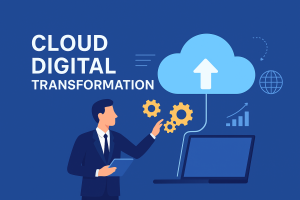In today’s rapidly evolving business environment, organizations are embracing Enterprise Resource Planning (ERP) solutions to streamline operations, improve efficiency, and make data-driven decisions. However, implementing an ERP system is just the beginning. Continuous improvement through ERP enhancements is essential to staying agile, secure, and aligned with industry trends.
With years of experience delivering tailored ERP solutions, Redtgs helps businesses across industries automate processes, integrate systems, and optimize performance. Whether deploying a cloud-based ERP for scalability or upgrading an existing platform for better functionality, organizations can rely on expert guidance to ensure successful implementation and sustained growth.
What is ERP Implementation?
ERP implementation refers to the process of integrating an Enterprise Resource Planning system into a company’s operations to centralize data, automate workflows, and enhance collaboration across departments. Unlike standalone applications, ERP connects functions such as finance, human resources, supply chain management, and customer service within a unified platform.
Successful implementation requires thorough planning, system customization, data migration, and user training to ensure that the technology supports business goals rather than disrupts them. With the right approach, ERP can transform how a company operates, driving efficiency and boosting productivity.
Benefits of ERP Implementation
- Operational Efficiency: Automates routine tasks, reducing time and effort while enhancing accuracy.
- Real-Time Insights: Provides access to dashboards and analytics that improve decision-making.
- Scalability: Adapts to growth and changing business needs through flexible configurations.
- Improved Collaboration: Enables teams to work together by sharing data and resources seamlessly.
- Compliance and Security: Helps maintain regulatory standards and ensures sensitive data is protected.
The ERP Implementation Process
A structured implementation approach is essential for success. Here’s how a typical ERP deployment unfolds:
1. Requirement Gathering and Consulting
Before selecting the right system, businesses must understand their existing processes and future goals. Expert consultants assess current challenges and recommend ERP solutions tailored to specific workflows and industries.
2. Customization and Configuration
ERP solutions must be adapted to fit the unique needs of each organization. Customizations include workflow design, reporting features, user roles, and access permissions, ensuring that the system supports business objectives from the outset.
3. Data Migration
Transitioning from legacy systems to a new ERP platform requires careful planning. Accurate data migration involves transferring records securely while validating data integrity to prevent loss or corruption.
4. Integration with Existing Systems
ERP systems need to work seamlessly with other tools such as CRM platforms, payroll software, and third-party applications. Integration ensures data consistency and optimizes business processes across all functions.
5. User Training and Change Management
Technology adoption depends on how well employees understand and use the system. Structured training programs and documentation help users quickly become comfortable with new workflows, reducing resistance and promoting productivity.
6. Testing and Quality Assurance
Before the system goes live, it undergoes rigorous testing to ensure performance, reliability, and security. Functional testing, load testing, and validation checks are performed to identify and resolve issues early.
7. Post-Implementation Support
After deployment, ongoing support is crucial to address user concerns, system errors, and performance adjustments. Continuous monitoring and updates help maintain system efficiency and meet evolving business needs.
Why ERP Enhancements Matter
Once an ERP system is operational, businesses must adapt to new challenges, technologies, and market expectations. Enhancements ensure that the system remains aligned with long-term goals while continuously improving processes.
Key Benefits of ERP Enhancements
- Process Optimization: Streamlines workflows for increased efficiency and better resource allocation.
- Feature Expansion: Adds modules such as artificial intelligence, advanced analytics, or mobile access to meet growing demands.
- Performance Improvement: Fine-tunes system architecture for faster response times and improved user experience.
- Regulatory Compliance: Ensures that systems remain up-to-date with the latest industry standards and legal requirements.
- Data Security: Implements stronger protocols to protect against cyber threats and data breaches.
Through enhancements, organizations can ensure their ERP system evolves with their business, delivering ongoing value and enabling informed decision-making.
Cloud ERP vs. On-Premise ERP
Choosing between cloud-based and on-premise ERP depends on an organization’s size, goals, and budget.
- Cloud ERP: Offers scalability, remote accessibility, and lower infrastructure costs. It is ideal for businesses seeking faster implementation and easier maintenance.
- On-Premise ERP: Provides greater control over customization, data storage, and security. Suitable for organizations with stringent compliance requirements or complex workflows.
Consultants work closely with stakeholders to determine the best fit, ensuring the chosen solution aligns with both present and future business needs.
Industries That Benefit from ERP Solutions
- Manufacturing: Streamlines production scheduling, inventory management, and supply chain operations.
- Healthcare: Enhances patient data management, billing, and regulatory reporting.
- Retail: Improves inventory tracking, sales forecasting, and customer engagement.
- Finance: Automates accounting processes, risk assessment, and compliance reporting.
- Logistics: Optimizes distribution, fleet management, and operational efficiency.
Each industry faces unique challenges, and ERP systems can be tailored to meet specific requirements while improving overall performance.
Why Choose Expert ERP Services?
ERP projects are complex, requiring a blend of technology expertise and industry knowledge. By partnering with a provider that understands the nuances of ERP implementation and enhancement, businesses can avoid common pitfalls and ensure long-term success.
Expert services include strategic planning, hands-on deployment, user training, and ongoing support—helping organizations get the most out of their technology investments. With scalable solutions and continuous improvements, ERP becomes more than software—it becomes a catalyst for growth.
Conclusion – Empowering Business Transformation
ERP implementation and enhancement services are vital for businesses aiming to stay competitive, efficient, and future-ready. By automating workflows, integrating systems, and optimizing performance, ERP solutions transform how organizations operate and deliver value.
With the right guidance and support, businesses can confidently deploy ERP systems that meet their unique needs and scale as they grow. A trusted partner helps not only with implementation but also with continuous improvement, ensuring that the ERP system remains a strategic asset for years to come. Reach out today to learn how expert ERP services can help your business unlock its full potential and navigate the complexities of digital transformation.
Frequently Asked Questions (FAQs)
Q1. What is ERP implementation, and why is it important?
ERP implementation is the process of integrating an Enterprise Resource Planning system into an organization to streamline workflows, centralize data, and automate business processes. It’s important because it helps businesses improve efficiency, reduce operational costs, and make data-driven decisions.
Q2. What industries benefit from ERP implementation and enhancements?
Industries such as manufacturing, healthcare, retail, finance, and logistics benefit the most from ERP solutions. These sectors often deal with complex processes, compliance requirements, and data management challenges that ERP helps simplify.
Q3. What is the difference between cloud ERP and on-premise ERP?
Cloud ERP offers scalability, remote access, and lower infrastructure costs, making it suitable for businesses that need flexibility and fast deployment. On-premise ERP gives businesses greater control over customization and data security, ideal for organizations with strict compliance needs.
Q4. How does ERP enhancement help businesses?
ERP enhancement ensures that the system remains up-to-date with industry changes, improving workflows, adding new functionalities, enhancing performance, and maintaining security. This helps businesses stay agile and meet evolving customer and market demands.
Q5. What role does user training play in ERP implementation?
User training is critical for successful ERP adoption. Proper training ensures that employees understand how to use the system effectively, reduces resistance to change, and helps achieve better productivity from day one.
Q6. How can data migration be handled during ERP implementation?
Data migration is carefully planned and executed by transferring records from legacy systems to the new ERP platform while validating data integrity and ensuring no information is lost or corrupted during the process.






